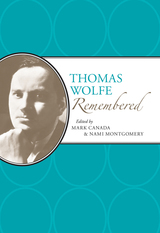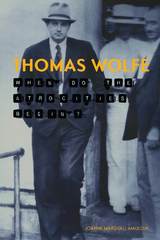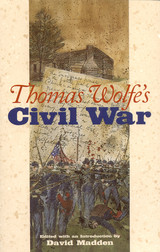
Thomas Wolfe, one of the giants of twentieth-century American fiction, is also one of the most misunderstood of our major novelists. A man massive in his size, his passions, and his gifts, Wolfe has long been considered something of an unconscious genius, whose undisciplined flow of prose was shaped into novels by his editor, the celebrated Maxwell Perkins.
In this definitive and compelling biography, Pulitzer Prize–winning historian David Herbert Donald dismantles that myth and demonstrates that Wolfe was a boldly aware experimental artist who, like James Joyce, William Faulkner, and John Dos Passos, deliberately pushed at the boundaries of the modern novel. Donald takes a new measure of this complex, tormented man as he reveals Wolfe’s difficult childhood, when he was buffeted between an alcoholic father and a resentful mother; his “magical” years at the University of North Carolina, where his writing talent first flourished; his rise to literary fame after repeated rejection; and the full story of Wolfe’s passionate affair with Aline Bernstein, including their intimate letters.

Thomas Wolfe’s life may seem to be an open book. A life that, after all, was the source for his best-known works, including the novels Look Homeward, Angel and Of Time and the River, as well as his numerous short stories and dramas. Since his death in 1938, scholars and admirers of Wolfe have relied largely on these texts to understand the man himself.
Thomas Wolfe Remembered provides something new: a rich, multifaceted portrait painted by those who knew him (casually or intimately), loved him (or didn’t), and saw, heard, and experienced the literary (and literal) giant. This volume gathers in one place for the first time dozens of reminiscences by friends, family members, colleagues, and casual acquaintances, adding color and fine details to the self-portrait the author created in his novels.
Wolfe found plenty to challenge and frustrate him throughout his life, from his boyhood in Asheville, North Carolina, to his education at the University of North Carolina and Harvard University, through his time in New York and Europe, his travels through the American West, and his death in Baltimore. He experienced two distracted parents in a loveless marriage, the premature death of a beloved brother, a minor stutter, and the difficulties of controlling a mercurial temper. Yet Wolfe’s exuberance, perceptiveness, memory, and compulsion to record virtually all that he experienced made for an extravagance of material that sometimes angered the people whose lives he used as source material.
Editors Mark Canada and Nami Montgomery have collected dozens of remembrances, many unpublished or long forgotten, including pieces from Julia Wolfe, Margaret Roberts, Frederick Koch, Maxwell Perkins, Elizabeth Nowell, Edward Aswell, and Martha Dodd. Some are endearing, others are disturbing, and many are comical. All provide glimpses into the vibrant, haunted, boyish, paranoid, disheveled, courteous, captivating, infuriating, and altogether fascinating giant who was Thomas Wolfe.

By adding new information and insight, Mauldin challenges much of the existing biographical material on the writer and offers a fresh view on the final years of his life. Through the utilization of primary and secondary sources including letters, interviews, recordings, and newspaper clippings, Mauldin offers a candid account of the life of Thomas Wolfe from the time of his visit to North Carolina in 1937 until his untimely death in 1938. Mauldin chronicles details of Wolfe's shocking change in publishers and his complex relationships with his editors, family, friends, and his mistress. This examination goes beyond Wolfe's life and extends into the period after his death, revealing details about the reaction of family and friends to the passing of this literary legend, as well as the cavalier publishing practices of his posthumous editors.
Mauldin's narrative is unique from other biographical accounts of Thomas Wolfe in that it focuses solely on the final years in the life of the author. Her unbiased approach enables the reader to draw his or her own conclusions about Wolfe and his actions and state of mind during these last two years of his life.

An anthology of Thomas Wolfe’s short stories, novel excerpts, and plays illuminating the Civil War
This collection of Thomas Wolfe’s writings demonstrates the centrality of the Civil War to Wolfe’s literary concerns and identity. From Look Homeward, Angel to The Hill Beyond and The Web and the Rock, Wolfe perpetually returned to the themes of loss, dissolution, sorrow, and romance engendered in the minds of many southerners by the Civil War and its lingering aftermath. His characters reflect time and again on Civil War heroes and dwell on ghostlike memories handed down by their mothers, fathers, and grandfathers. Wolfe and his protagonists compare their contemporary southern landscape to visions they have conjured of its appearance before and during the war, thereby merging the past with the present in an intense way. Ultimately, Wolfe’s prose style—incantatory and rhapsodic—is designed to evoke the national tragedy on an emotional level.
Selections of Wolfe’s writings in this collection include short stories ("Chickamauga," "Four Lost Men," "The Plumed Knight"), excerpts from his novels (O Lost, the restored version of Look Homeward, Angel, The Hills Beyond, and Of Time and the River) and a play, Mannerhouse, edited and introduced by David Madden. Madden, who makes the provocative claim that everything a southern writer writes derives from the Civil War experience, also highlights many issues essential to understanding Wolfe’s absorption with the Civil War.
READERS
Browse our collection.
PUBLISHERS
See BiblioVault's publisher services.
STUDENT SERVICES
Files for college accessibility offices.
UChicago Accessibility Resources
home | accessibility | search | about | contact us
BiblioVault ® 2001 - 2024
The University of Chicago Press









